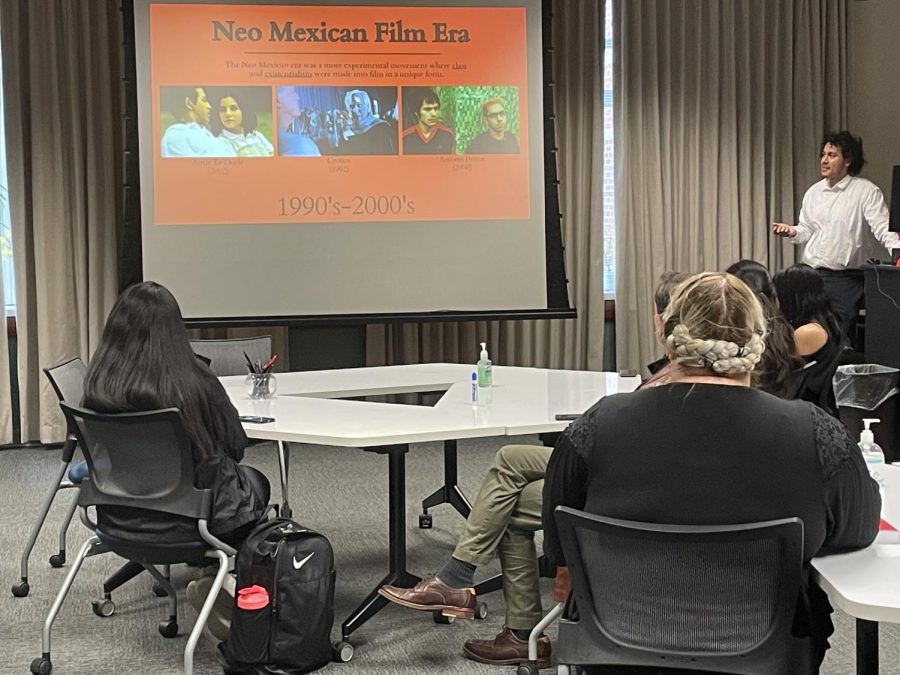Culture corner’s Mexican cinema edition illustrates the universal language of storytelling
April 26, 2023
Light snacks and an eager audience created a productive, discussion-filled environment centered around the cultural history of Mexican Cinema.
The Diversity and Equity Center (DEC) hosted a culture corner on April 18 in Black Hall 101 on Mexican Cinema. DEC student coordinator and anthropology senior Roberto Chavez gave a presentation on the reflection of culture and time periods within the Mexican film industry.
“I think this type of discussion is important because it gives dialogue to the fact that if you can read subtitles, you can watch any movie,” Chavez said. “And once you understand dialogue, you can understand different kinds of stories…and maybe even different genres of films that you never thought were a thing.”
Post-Event Interview with Chavez
Born in Mexico and having immigrated to the U.S. at a young age, Chavez explained that he wanted to reconnect with his culture in some way through music or film while recognizing the history of Mexico.
“I really wanted to focus on Mexican cinema because I noticed that a lot of movies in America portray Mexican cinema or even just Mexican actors as stereotypes and that’s it,” Chavez said. “In reality, it’s a wide variety of actors and genres and films.”
Chavez explained that the movies he presented were a mixture of movies he had grown up with and movies he had to research. He said that the challenge of finding Mexican movies to watch was that most of the old movies were on DVDs or VHS, which weren’t sold in Target or Walmart.
Chavez noticed a pattern with most of the movies he researched. He realized that poverty and underdog stories were a common theme of most of the movies.
“I feel like we need more relaxed stories,” Chavez said. “Sure, you can have serious films, but you should also be able to have comedies that make you laugh genuinely and aren’t just cheap jokes.”
Regarding movie recommendations, Chavez mentioned “Amar te Duele” and “I’m No Longer Here” as two of his favorite films. He explained that “Amar te Duele” portrays the different dynamics and lifestyles in Mexico regarding economy and class as barriers to finding love.
Chavez gave his opinion on native English speakers who are against watching movies with subtitles. “It’s almost like a privilege thing,” Chavez said. “You already have had amazing cinema for 100 years. So, you think you have the right to just watch movies in your own language when you’re kind of starving yourself from different stories. I think there’s a lot of good stories that deserve that audience and recognition. I feel like because it’s so hard to break that language barrier here in America, people kind of give up on it.”
Chavez explained that one of the things he hopes attendees took away from his presentation is an interest in cinema outside of Hollywood.
“I hope they gained a curiosity to watch films and then tell their friends to watch more foreign films, and not even just from Mexico,” Chavez said.
Presentation
During his presentation, Chavez analyzed the different eras of Mexican cinema dating back to the 1930s right up to the 2000s. The presentation consisted of Chavez’s analysis of Mexican films across the decades as well as Q&A sections for the audience.
During the Q&A, Chavez asked attendees about their thoughts on the impact of early Mexican cinema based on his analysis.
After the event, a majority of the audience members expressed the importance of a discussion like this on campus.
“CWU gets awards for diversity, and we never really see that implemented in the school,” Graduate Teaching Assistant Fatima Acevedo said. “Events like this make it more representative and interesting.
Anthropology Professor and Interim Associate in graduate studies Rodrigo Renteria expressed how impressed he was by Chavez’s presentation as a Mexican immigrant who grew up watching the movies presented.
“It was fascinating to see how the first era of the Golden Age was so seminal to producing Mexican identities,” Renteria said. “Now as Mexican cinema gets together with Hollywood it changes the scope of what can be done.”
“The questions that Roberto asked were so important, how do we relate to these [movies] personally and also how is this part of a bigger picture?” Renteria said.


